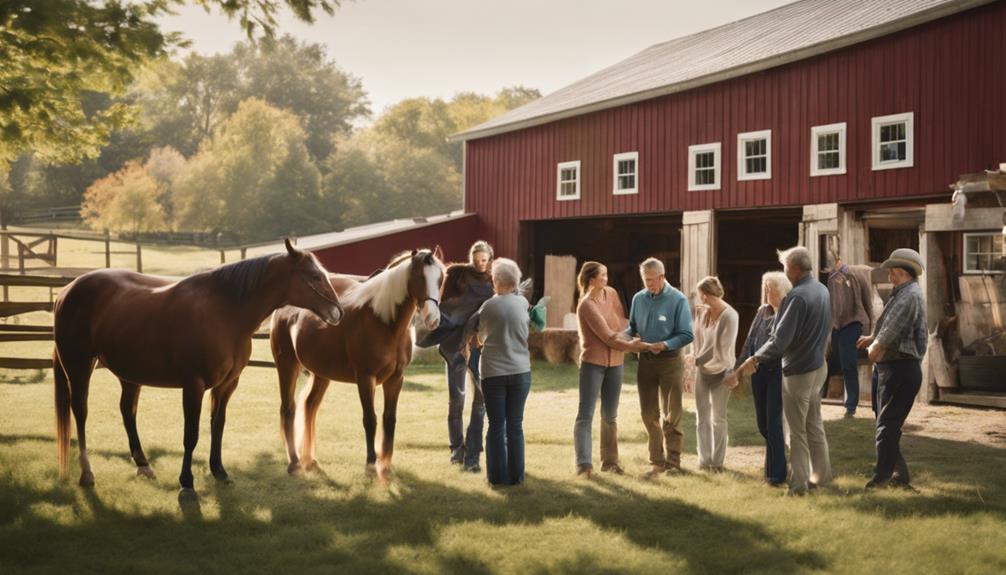Why Choose Local Equine Assisted Therapy?
When navigating the vast landscape of therapeutic options, choosing local equine assisted therapy is like finding a hidden gem in your own backyard. Imagine the possibilities that unfold when you connect with these majestic creatures in a therapeutic setting.
The bond between humans and horses holds a profound impact on well-being, but there's more to it than meets the eye. The unique blend of nature, professional guidance, and equine companionship offers a holistic approach to healing that resonates deeply within.
The journey of self-discovery and growth awaits, where the hoofbeats of these gentle giants pave the way to transformation.
Benefits of Equine Assisted Therapy
Exploring the benefits of equine assisted therapy can shed light on the profound impact these majestic animals can have on individuals seeking healing and growth. The emotional healing that occurs through interactions with horses is remarkable. Horses have a unique ability to sense and respond to human emotions, providing a safe space for individuals to explore and process their feelings. This can lead to breakthroughs in emotional healing, allowing individuals to release pent-up emotions and find a sense of peace and clarity.
Moreover, the benefits of equine assisted therapy extend to mental wellness. Interacting with horses can help individuals reduce stress, anxiety, and depression. The rhythmic motion of horseback riding, for example, has been shown to have a calming effect on the mind, promoting relaxation and mental clarity. Additionally, caring for a horse can instill a sense of purpose and accomplishment, boosting self-esteem and confidence.
Local Equine Therapists' Expertise
Local equine therapists bring a wealth of experience and specialized training to their practice, ensuring top-notch care for individuals seeking equine assisted therapy. These professionals are dedicated to providing the best possible treatment, tailored to meet the unique needs of each client.
- Therapist Qualifications: Local equine therapists undergo rigorous training and certification processes to ensure they're equipped with the necessary skills and knowledge to provide effective therapy. Their qualifications often include degrees in counseling, psychology, social work, or related fields, along with specialized training in equine assisted therapy techniques.
- Local Knowledge: Being part of the local community allows equine therapists to have a deep understanding of the area's resources, culture, and support systems. This local knowledge enables them to make personalized recommendations and connections for their clients beyond the therapy sessions.
- Continuous Professional Development: To stay at the forefront of their field, local equine therapists engage in continuous professional development. They attend workshops, conferences, and training sessions to enhance their skills, learn about the latest research, and incorporate new techniques into their practice.
Choosing a local equine therapist means you're selecting a professional with the right qualifications, local insight, and a commitment to ongoing learning to provide you with the best possible care.
Personalized Treatment Plans
With a focus on tailoring therapy to your specific needs, the development of personalized treatment plans by local equine therapists ensures a targeted and effective approach to your healing journey. Through individualized care and a customized approach, these professionals take into account your unique requirements, preferences, and therapeutic goals to create a treatment plan that best suits you.
The beauty of personalized treatment plans lies in their ability to address your specific challenges and work towards your desired outcomes. By collaborating closely with local equine therapists, you can actively participate in shaping your therapy experience. This tailored approach not only enhances the effectiveness of the sessions but also fosters a sense of empowerment and ownership over your healing process.
Moreover, the customized nature of these treatment plans allows for flexibility and adjustments as needed. Your progress is continuously monitored, and modifications can be made to ensure that the therapy remains relevant and beneficial to you. This adaptability ensures that you receive the most optimal care throughout your healing journey.
In essence, the personalized treatment plans offered by local equine therapists epitomize a client-centered approach to equine-assisted therapy. By prioritizing your individual needs and preferences, these plans pave the way for a truly transformative and healing experience.
Accessibility to Equine Facilities
Accessible equine facilities near you provide convenient opportunities for engaging in equine-assisted therapy. When considering the accessibility of equine facilities, several key factors come into play:
- Proximity in a Rural Setting: Unlike urban areas where equine facilities might be scarce, rural settings often boast a higher concentration of such facilities. This proximity makes it easier for individuals in rural areas to access equine-assisted therapy without having to travel long distances.
- Overcoming Transportation Challenges: For individuals facing transportation challenges, such as lack of personal vehicles or limited public transportation options, having equine facilities nearby can be a game-changer. Being able to reach the therapy location more easily can significantly increase the consistency of sessions and overall engagement in the therapy process.
- Enhanced Community Support: In rural areas, equine facilities often serve as community hubs where support networks naturally form. This sense of community can provide additional benefits beyond the therapy itself, creating a supportive environment that fosters growth and healing.
Community Support and Involvement
Engaging with the community and fostering involvement plays a crucial role in the success of equine-assisted therapy programs. Community support is essential for these programs to thrive. By offering volunteer opportunities, individuals from the community can actively participate in the therapy sessions, gaining a deeper understanding of the benefits horses bring to those in need.
Fundraising events organized within the community not only help in raising necessary funds but also create a sense of unity and common purpose among community members.
Community partnerships are another vital aspect of local equine-assisted therapy. Collaborating with local organizations, such as schools or counseling centers, can help in reaching a broader audience and providing services to a more diverse group of individuals.
Outreach programs aimed at educating the community about the benefits of equine-assisted therapy can also help in breaking down stigmas and misconceptions surrounding mental health treatment.
Familiarity With Local Horses
To enhance the effectiveness of local equine-assisted therapy programs, developing a strong familiarity with the characteristics and behaviors of the horses in the community is paramount. When you connect with local horses on a deeper level, you pave the way for a more meaningful therapeutic bond and a more successful therapy experience overall.
- Horse Connection: Getting to know the horses in your local area allows you to understand their individual personalities, preferences, and triggers. This connection forms the foundation for building trust and communication during equine-assisted therapy sessions.
- Therapeutic Bond: Familiarity with local horses enables you to tailor therapy sessions to the specific needs and responses of each horse. This personalized approach not only enhances the bond between you and the horse but also maximizes the therapeutic benefits for all participants involved.
- Trust Building: By spending time with local horses, you can learn how to approach, handle, and interact with them in a way that fosters trust and mutual respect. This trust-building process is crucial for creating a safe and supportive environment where therapeutic breakthroughs can occur.
Convenience of Proximity

The close proximity of local equine therapy facilities enhances the ease of access for participants seeking therapeutic sessions with horses. When these facilities are nearby, it becomes more convenient for you to schedule and attend sessions without the hassle of long commutes. The proximity advantages of local equine therapy centers mean that you can easily incorporate these sessions into your routine, making it a seamless part of your schedule.
Being close to a local equine therapy facility also provides location benefits that go beyond just convenience. It allows you to immerse yourself in a natural setting, away from the hustle and bustle of urban life. The peaceful surroundings of these facilities contribute to the therapeutic experience, helping you relax and focus on the healing interaction with the horses.
Moreover, the close proximity of local equine therapy centers can also foster a sense of community among participants. When the facility is nearby, you're more likely to meet and connect with others who share a similar interest in equine-assisted therapy. This sense of community and shared experience can enhance the overall benefits of the therapy sessions, providing you with a supportive network of individuals who understand and encourage your journey towards healing.
Cost-Effective Therapy Options
Exploring cost-effective therapy options can provide you with accessible avenues to engage in equine-assisted therapy without straining your budget. When considering equine-assisted therapy, prioritizing budget-friendly options can ensure you receive the benefits of this therapeutic approach without financial stress. Here are some reasons why opting for affordable options can be advantageous:
- Sliding Scale Fees: Many local equine therapy centers offer sliding scale fees based on income, making it a more affordable option for individuals with varying financial resources.
- Group Sessions: Participating in group therapy sessions can significantly reduce the cost per session compared to individual sessions, allowing you to experience the benefits of equine-assisted therapy at a lower price point.
- Community Programs: Some community programs or non-profit organizations may offer equine-assisted therapy at reduced rates or even for free, providing you with a budget-friendly way to engage in this therapeutic activity.
Frequently Asked Questions
How Do Horses Specifically Contribute to the Therapeutic Process in Equine Assisted Therapy?
Horses play a crucial role in equine assisted therapy by promoting emotional regulation and building trust. Their nonjudgmental nature and ability to reflect your emotions help you develop self-awareness and coping skills.
Through interacting with horses, you can learn to manage your feelings and build a sense of connection and trust, which are essential for the therapeutic process to be effective. Trusting these majestic animals can lead to profound personal growth and healing.
Are There Any Specific Certifications or Training Requirements for Equine Therapists in the Local Area?
To become an equine therapist in the local area, certification requirements and training programs are essential. These ensure that professionals have the necessary skills and knowledge to provide effective therapy using horses.
Look for therapists who've completed accredited equine therapy programs and hold certifications from recognized organizations. This guarantees that they've the expertise needed to conduct sessions safely and promote positive outcomes for clients.
How Do Local Equine Therapists Tailor Treatment Plans to Meet the Individual Needs of Each Client?
Local equine therapists offer personalized treatment plans that are tailored to meet your needs. They create customized approaches that are client-centered and individualized. By assessing your unique situation and goals, they develop interventions that address your specific challenges and promote growth.
What Safety Measures Are in Place to Ensure the Well-Being of Both Clients and Horses at the Equine Facilities?
Safety protocols at our equine facilities prioritize client well-being and horse care. Trained staff regularly inspect equipment, maintain secure fencing, and ensure proper horse handling. Emergency action plans are in place, and staff members are CPR certified.
Clients are oriented on safety procedures before interacting with the horses. These measures create a safe environment for everyone involved in the equine-assisted therapy sessions.
How Does the Local Community Play a Role in Supporting and Participating in Equine Assisted Therapy Programs?
In equine assisted therapy programs, the local community plays a vital role in supporting and participating. Community involvement creates a strong support network, fostering connections that enhance the therapy experience.
Conclusion
When considering equine assisted therapy, choosing local providers offers numerous benefits such as personalized treatment plans, accessibility to facilities, and community support.
Local therapists have expertise in working with horses from the area, making the therapy more effective and convenient for you.
By opting for local equine therapy, you can receive quality care that's cost-effective and tailored to your specific needs, ultimately leading to a successful and rewarding experience.
